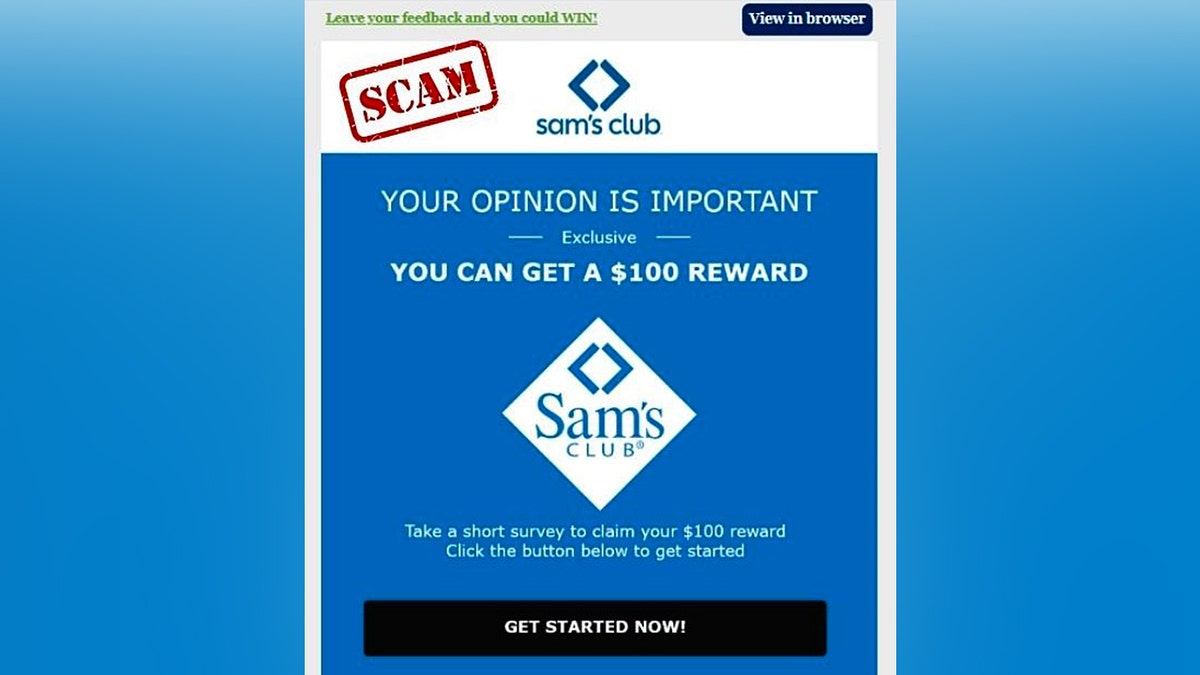NEWYou can now listen to Fox News articles!
Dennis and Carole recently reached out to us with a warning about a suspicious email claiming to offer a $100 Sam’s Club reward.
“We received this yesterday, and my wife fell for the scam and initiated the free gift offer. No credit card other than email transferred,” Dennis said.
The email looked professional, with the official Sam’s Club logo at the top. It read, “YOUR OPINION IS IMPORTANT. Exclusive. YOU CAN GET A $100 REWARD.” It then invited the recipient to “Take a short survey to claim your $100 reward. Click the button below to get started,” with a bold black button labeled “GET STARTED NOW!”
Despite no credit card being entered, the couple wanted to know:
- Will scammers be able to charge their credit card?
- Do they already have credit card info?
- What steps should they take?
Let’s break this all down.
Sign up for my FREE CyberGuy Report
Get my best tech tips, urgent security alerts and exclusive deals delivered straight to your inbox. Plus, you’ll get instant access to my Ultimate Scam Survival Guide – free when you join my CYBERGUY.COM newsletter.
THE TRUTH BEHIND THOSE MYSTERIOUS SHIPMENT EMAILS IN YOUR INBOX

A couple warns about a new email scam disguised as a Sam’s Club survey. (Kurt “CyberGuy” Knutsson)
Why this Sam’s Club email is a scam
At first glance, the email looked like it came straight from Sam’s Club, complete with the logo, blue color scheme and a tempting promise of a $100 reward for filling out a short survey. That’s exactly what scammers want you to think.
This is a classic phishing scam. Cybercriminals copy a trusted brand’s style to trick you into clicking their links or entering personal information. Once you engage, they can:
- Collect your email address for spam lists
- Send more realistic-looking phishing attempts
- Try to lure you into giving up payment or account details in future messages
- Direct you to malware-infected websites
In this case, only an email address was entered. That means there’s no direct credit card risk, yet. However, scammers now know the address is active and that someone at it will click through, making it more valuable for targeted scams later. The next step is protecting yourself quickly, because stopping them now is far easier than dealing with identity theft later.
DON’T FALL FOR THIS BANK PHISHING SCAM TRICK

Experts warn consumers not to click suspicious looking links. (Peter Dazeley)
How to protect yourself after clicking a link in a scam email
If you entered your email in a scam form, take these steps right away to reduce the risk of further attacks:
1) Use strong antivirus software
Run a scan with a trusted antivirus program. Many modern security tools also include phishing protection, blocking dangerous links before they can load. The best way to safeguard yourself from malicious links that install malware, potentially accessing your private information, is to have antivirus software installed on all your devices. This protection can also alert you to phishing emails and ransomware scams, keeping your personal information and digital assets safe.
Get my picks for the best 2025 antivirus protection winners for your Windows, Mac, Android & iOS devices at CyberGuy.com.
2) Mark the email as phishing
Use your email provider’s spam or phishing report tool to flag the message. This helps block future attempts and trains filters to catch similar scams.
3) Consider a data removal service
Data removal services can contact data brokers to remove your personal information from their lists. This makes it harder for scammers to target you with more personalized attacks. While no service can guarantee the complete removal of your data from the internet, a data removal service is really a smart choice. They aren’t cheap — and neither is your privacy. These services do all the work for you by actively monitoring and systematically erasing your personal information from hundreds of websites. It’s what gives me peace of mind and has proven to be the most effective way to erase your personal data from the internet. By limiting the information available, you reduce the risk of scammers cross-referencing data from breaches with information they might find on the dark web, making it harder for them to target you.
Check out my top picks for data removal services and get a free scan to find out if your personal information is already out on the web by visiting Cyberguy.com.

Scammers are claiming to offer a $100 Sam’s Club reward. (REUTERS/Rick Wilking)
Get a free scan to find out if your personal information is already out on the web: Cyberguy.com.
4) Watch for follow-up scams
Scammers often follow up with urgent-sounding emails to “confirm” your account or claim you won a prize. Delete these immediately without clicking links or opening attachments.
5) Change your passwords and strengthen security
Never reuse the same password across multiple accounts. If scammers target your email address, they may try it with common password guesses. Create unique, strong passwords for each account and store them in a reputable password manager.
Check out the best expert-reviewed password managers of 2025 at Cyberguy.com.
6) Report the scam
Forward the email to:
- Sam’s Club: [email protected]
- FTC: [email protected]
Reporting helps both the brand and law enforcement track scam activity.
CLICK HERE TO GET THE FOX NEWS APP

Consumers are advised to report phishing emails to the company or the FTC. (CyberGuy.com)
Kurt’s key takeaways
Even if you avoid entering payment details, your personal information still has value to scammers. An email address can open the door to phishing attacks designed to steal passwords, install malware, or gather more sensitive data. Scammers know how to make an email look convincing, especially when they dangle a gift card as bait. By staying alert, reporting suspicious emails and protecting your personal data, you can reduce your risk.
Have you ever received a fake reward email from a brand you trust? How did you handle it? Let us know by writing to us at Cyberguy.com.
Sign up for my FREE CyberGuy Report
Get my best tech tips, urgent security alerts and exclusive deals delivered straight to your inbox. Plus, you’ll get instant access to my Ultimate Scam Survival Guide – free when you join my CYBERGUY.COM newsletter.
Copyright 2025 CyberGuy.com. All rights reserved.








